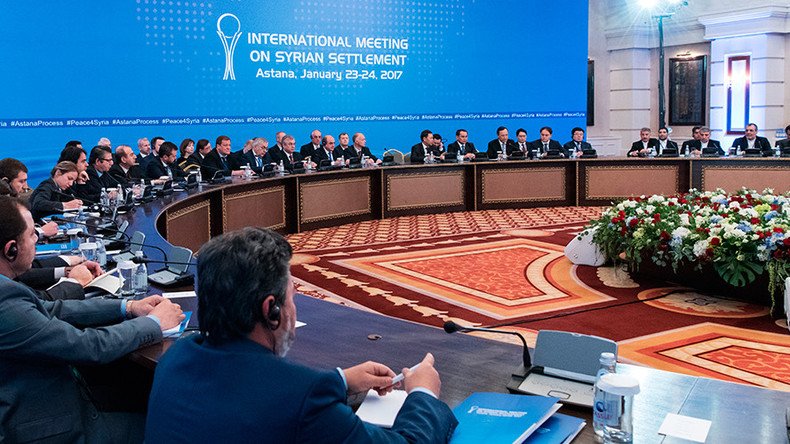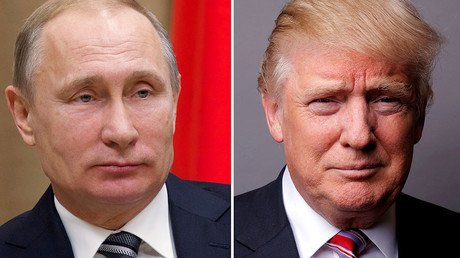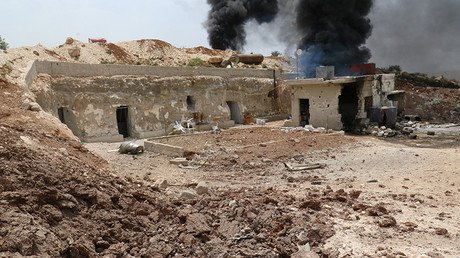US to send senior MidEast diplomat to Syria talks in Astana after Putin-Trump call

Washington is dispatching a top State Department official as the US representative at the new round of intra-Syrian talks in Astana that kick off Wednesday. The move follows a call between US and Russian leaders, in which they discussed de-escalation in Syria.
While the US did send its observers to two previous rounds of the ceasefire talks, which were sponsored by Russia, Turkey and Iran and hosted by Kazakhstan for the fourth time, its senior representative at the meeting was US Ambassador to Kazakhstan George Krol. This time, however, its representative will be Acting Assistant Secretary of State for Near East Affairs Stuart Jones, who previously served as US ambassador to Iraq in 2014-16 and to Jordan in 2011-14, Reuters reported, citing the State Department.
“Ambassador Jones' participation as the US observer is indicative of US support for a political resolution to the Syrian crisis,” the US Embassy in Syria, which closed its operation in Damascus in 2012 but keeps working through other diplomatic missions, wrote on Twitter.
Stressing that the US backs “any discussion that can lead to a de-escalation of violence” and result in guarantees of unhindered access of humanitarian assistance to the suffering population, the embassy at the same time cast doubt on the Astana talks of being helpful in either respect.
The announcement was preceded by what the White House described as a “very good” telephone conversation between Russian President Putin and his US counterpart Donald Trump. The leaders had an in-depth discussion of the situation in Syria, including the creation of the so-called “safe zones,” long touted by Trump.
While not elaborating on the contents of the conversation, US Secretary of State Rex Tillerson called it “a very constructive call.”
“It was a very, very fulsome call, a lot of detailed exchanges. So we’ll see where we go from here,” Tillerson said ahead of the meeting with Saudi Arabia’s foreign minister, Adel al-Jubeir, on Tuesday.
‘Highly provocative’: #Lavrov says agreed with #Tillerson no future US strikes on Syrian govt https://t.co/ZGi11Ouk3r
— RT (@RT_com) April 13, 2017
In turn, Moscow referred to the exchange as “constructive” and “businesslike.”
In March, the Kazakh Foreign Ministry spokesman revealed that the US delegation in Astana peace talks that were held in mid-March would see “a representative from Washington” attending together with Ambassador Krol. However, he provided no details concerning the status or the identity of the official.
READ MORE: Geneva talks ‘outlined the way forward’ for Syrian settlement – Russian envoy
Tuesday’s Putin-Trump phone call was the first since the US missile strike on the Syrian airbase, ordered by Trump in response to the chemical incident in the rebel-held Idlib Province, which reportedly led to the deaths of scores of civilians, including children. Despite the Syrian government denying all the claims of its involvement in the alleged chemical attack, Washington said the launch was in retaliation to the incident. Several Syrian military servicemen as well as civilians died as result of the attack. Russia condemned the attack on the Syrian territory as a blatant breach of sovereignty with the US-Russia relations sinking to a new low.
Apart from Syria, Putin and Trump also touched upon North Korea and its nuclear and missile program and how to ease the tension building around the peninsula through diplomatic channels. The leaders also discussed the possibility of a meeting on the sidelines of G20 summit in July.
The first round of Astana peace talks between the representatives of the Syrian rebel groups and the Syrian government in December resulted in a breakthrough, with a nationwide ceasefire being established in the country since December 30. Serving as guarantors of the truce are Turkey, Russian and Iran. The current talks on May 3-4 will also feature the UN special envoy for Syria, Staffan de Mistura, invited by the Kazakh government, as well as representatives from Jordan.
"The observers will remain the same," Kazakhstan’s First Deputy Foreign Minister Mukhtar Tleuberdi said on Tuesday, as cited by TasnimNews.














